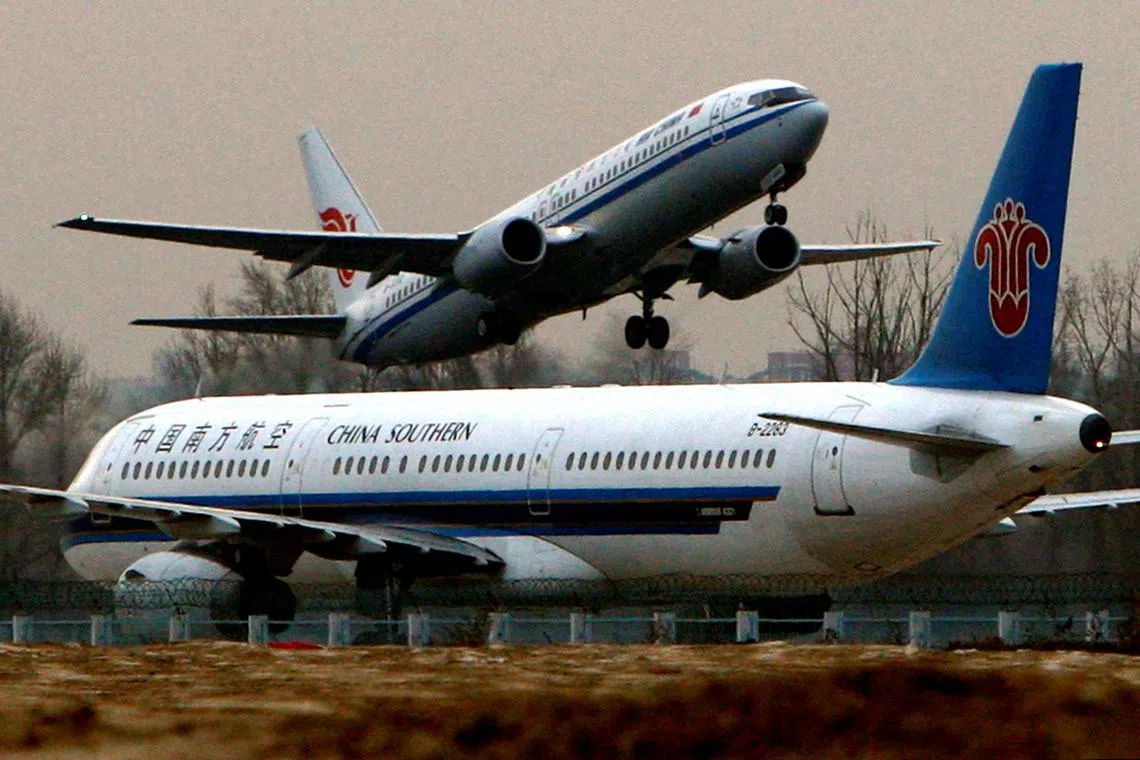China to make substantial Covid-19 policy changes soon: Former government chief epidemiologist
Sign up now: Get insights on Asia's fast-moving developments

The Civil Aviation Administration of China said last month the country will more than double international passenger flights between October and late-March.
PHOTO: REUTERS
Follow topic:
BEIJING - China will make substantial changes to its “dynamic-zero” Covid-19 policy in coming months, a former Chinese disease control official told a conference hosted by Citi on Friday, according to a recording of the session heard by Reuters.
Dr Zeng Guang, former chief epidemiologist at the Chinese Centre for Disease Control and Prevention who has remained outspoken on China’s Covid-19 fight, said the conditions for China opening up were “accumulating”, citing new vaccines and progress the country had made in antiviral drug research.
Asked by Citi chief China economist Yu Xiangrong if China would open up after its annual meeting of Parliament that traditionally takes place in early March, he said many new policies would be introduced in the next five to six months, without indicating the basis for that information.
“The situation is changing now and China’s ‘dynamic zero’ will also undergo major changes. Substantive changes will happen soon,” he said, according to the recording of the session, which was titled “China’s Exit Strategy from Zero-Covid”.
Citi declined to comment on Dr Zeng’s remarks. Dr Zeng and Dr Yu did not immediately respond to requests for comment.
Dr Zeng’s remarks add impetus to recent investor hopes China will ease some of the strict measures that have inflicted deep damage to the world’s second-largest economy. This week’s optimism defies news of rising infections and widespread Covid-19 related disruptions in China, including the postponement on Friday of the Guangzhou auto show that had been planned for later this month.
Chinese health authorities will hold a press conference on Saturday on Covid-19 prevention, according to a notice that said officials from the the National Bureau of Disease Control and Prevention would attend. No other details were immediately available.
Dr Zeng was part of a top team at China’s National Health Commission when the virus started to spread from the central Chinese city of Wuhan to other parts of China in 2020. He has previously urged against using excessive measures to fight Covid-19 that risk exhausting people.
China may scrap system penalising airlines for bringing Covid-positive passengers in
China is also working on plans to scrap a system that penalises airlines for bringing virus cases into the country, according to people familiar with the matter, another sign that the authorities are looking for ways to ease the impact of the zero-Covid-19 policy.
The State Council, or China’s Cabinet, recently asked government agencies including the civil aviation regulator to prepare to end the so-called circuit breaker mechanism, said the people who asked not to be identified because the matter is sensitive.
The system sees airlines banned temporarily from specific routes into China for one to two weeks, depending on how many Covid-19-positive passengers they bring into the country.
A similar mechanism for Hong Kong was halted in July.
The request is part of a broader three-step plan devised mid-year to normalise China’s aviation industry, the people said, with the country effectively cut off from the rest of the world by its pandemic border curbs.
The first step was to increase the number of flights into China, which appears to already be under way.
The Civil Aviation Administration of China (CAAC) said last month the country will more than double international passenger flights between October and late March from the same period a year ago, and carriers including China Eastern Airlines and China Southern Airlines have said they are already looking at increasing flights.
The focus now appears to have moved to step two, with senior leaders recently asking regulators to draw up a game plan for easing the circuit breaker rule.
The third step would be facilitating a full return to normal aviation traffic, the people said. It is unclear what the timeline is for the implementation of these two steps.
The State Council and CAAC did not immediately respond to requests for comment.
Evidence that China is even considering changes that would ease its global isolation would be scrutinised by investors, with Chinese equities near multi-year lows because of the economic damage wrought by snap lockdowns, testing drives and border restrictions.
Shares of airlines, including China Eastern and China Southern, extended gains in Hong Kong on the flight ban news, while the yuan climbed in offshore trading.
An unverified screenshot circulating on social media claiming a broad reopening plan was being considered sparked a US$450 billion (S$637 billion) speculative rally in stock markets this week.
Soon after, China’s top health body reaffirmed its commitment to the zero-tolerance virus approach.
China may shorten quarantine for inbound travellers
In yet another sign China is at least cognisant of the impact of its restrictions at the border, officials are debating whether to reduce the amount of time people coming into the country must spend in mandatory quarantine, Bloomberg News reported in October.
Bureaucrats are looking at cutting the period to two days in a hotel and then five days at home, people familiar with the matter said.
That is down from 10 days of isolation on entry into the country, which includes a week confined to a hotel room.
China’s current circuit breaker policy makes getting into the country difficult for many travellers, even after it was tweaked in August.
Inbound routes are halted for one week if the percentage of infected passengers on a flight hits 4 per cent, with a two-week suspension if the rate reaches 8 per cent.
The previous policy triggered a two-week stoppage for a 5 per cent infection rate and a month’s suspension at 10 per cent. REUTERS, BLOOMBERG

